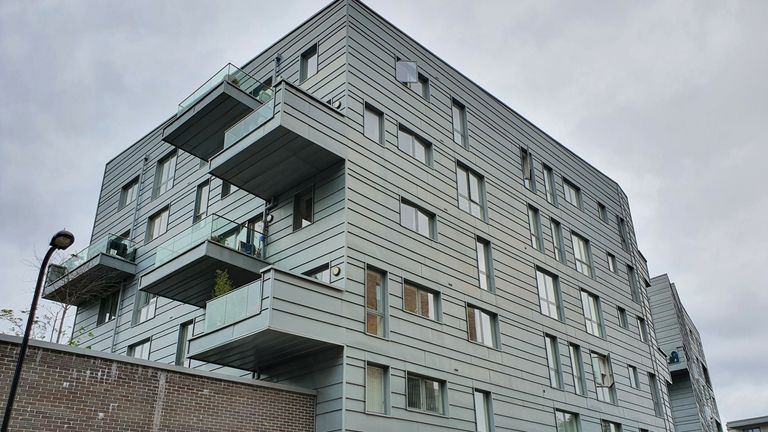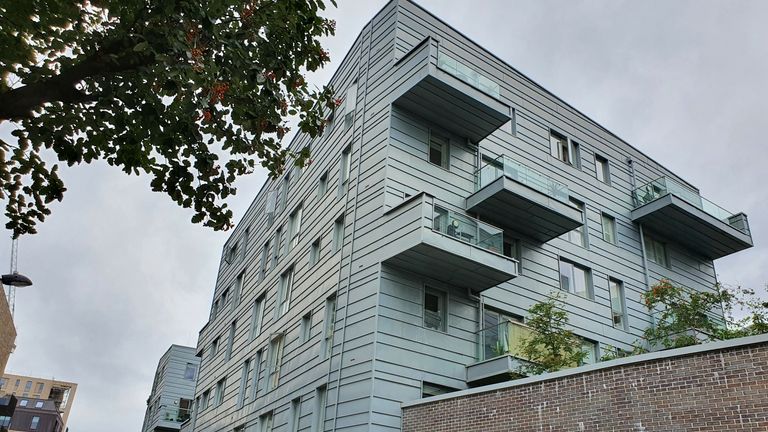Cladding checks: Circle of blame around post-Grenfell building safety rules has left me ‘stuck’
After the horror of Grenfell, new rules were brought in to ensure the safety of high-rise buildings – but the result is potentially thousands of people unable to move home because banks won’t lend mortgages on homes without a safety certificate.
Here, Nicki Cooper from Bromley, southeast London, explains why she is unable to look forward to the next part of her life.
I did what most of my generation was taught to do – save up and get on that first rung of the property ladder. I thought I’d created stability for my future, but now I’m stuck.
My husband and I want to move onto the next phase of our lives by moving out of London to be closer to my parents.
COVID-19 has made this even more important to us.
Instead, like many of my generation, I’ve been robbed of the ability to plan a future. More than anything, I lie awake at night wondering whether my home is even safe.
I listed my property in January. As it’s in a building under 18 metres I didn’t foresee any issues.
The government then updated its building safety guidance and called for dangerous cladding on all buildings, regardless of height, to be removed.
Despite receiving several offers it became clear that without an External Wall Fire Review (EWS1) form to confirm the building is safe, my property has no value in the eyes of mortgage lenders. Even now, thinking about it makes me want to cry.
A common rebuttal by freeholders is there aren’t enough qualified engineers to conduct the survey required.
My neighbours and I have been proactive and found engineers willing to produce the ESW1 report in a matter of weeks but the Freeholder, Peabody, will not allow us to instruct them nor are they willing to pay for their own engineer.
An assessment of our property could “mean further investigation (intrusive) or remediation”. There is no benefit to them paying for a report which may indicate work is needed because it creates a potentially large liability for them.
Peabody has been very clear that unless there is legislation that instructs them to do so, they won’t help us.
If Grenfell taught us something, it should be that housing associations should not so blatantly put a value on human life.
Planning how we would escape from the top floor of our building in the event of a fire is not a conversation I thought my husband and I would have to have in such detail.
Current government policy on building safety is ambiguous, confusing and at odds with stimulating the housing market.
It has done nothing but create a circle of blame, with developers, insurers, freeholders, and lenders all dodging responsibility.
Meanwhile, thousands are stuck in potentially unsafe buildings with no prospect of moving on. When will the government step in to break this cycle?
:: In response, freeholder Peabody told Sky News: “This is an extremely frustrating situation for leaseholders who are in this difficult position through no fault of their own and we are sorry for the anxiety this is causing. We’re doing everything we can to support them but sadly there is no quick solution.
“It’s an issue affecting hundreds of thousands of people up and down the country and is being driven by mortgage lenders and valuers wanting evidence that is complex and difficult to obtain.
“The safety of our residents is our absolute priority and we have a major building safety programme under way to ensure our homes meet the latest regulation issued in January. We have more than 2,000 buildings over 11 metres high and are working our way through these in order of risk.
“We are working as quickly as we can, but the reality is that it will take us some time to complete. This is due to the scale, the length of time each investigation takes and a shortage of qualified professionals to complete the work.
“We are supporting leaseholders by making representations to valuers or lenders where possible and discussing whether leaseholders can temporarily sub-let their property on a case by case basis.
“But to really resolve the issue it needs government action to facilitate lending, reform the certification process and to help finance and expedite the necessary surveys and works.”
A spokesperson for the government told Sky News: “Making sure residents are safe and feel safe in their homes is a priority for this government.
“Building owners must act swiftly to remediate their buildings, and we are providing £1.6bn to speed up this work. Homes are being made safer – more than 70% of high rise buildings with ACM cladding have completed or are in the process of remediation.
“We recognise the difficulties some people are facing on mortgages and are addressing this with industry. We do not support the blanket use of EWS1 forms and encourage lenders to accept equivalent evidence that demonstrates buildings are safe, for valuation purposes.”
Source: Read Full Article





